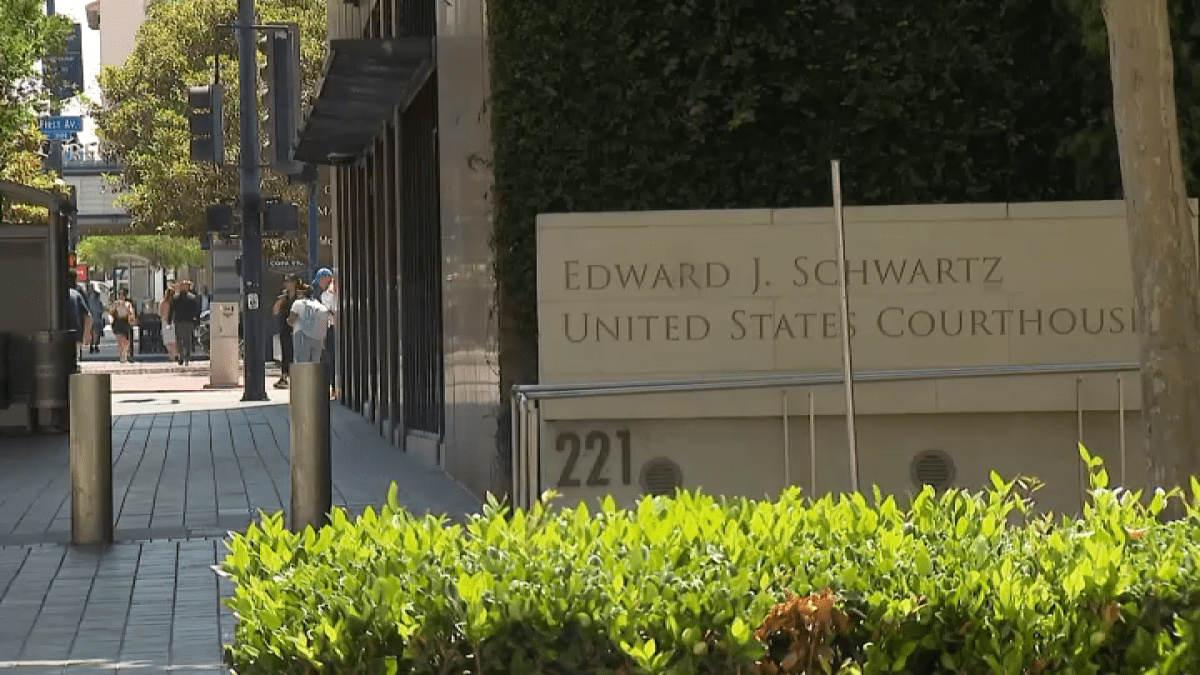As federal agents arrest people showing up for immigration hearings across the U.S., a man seeking asylum who was detained in San Diego has sued to stop this kind of enforcement, with a judge indicating in a hearing Wednesday that the case could later provide key insight into how the government is approaching and making these arrests.
The man, identified only as A.M. in court filings for his protection, fled torture in Morocco over his human rights advocacy work, he said in a declaration in support of his request for a preliminary injunction. He came to the U.S. to seek asylum and on June 3, arrived at a hearing at the San Diego federal building to learn his case was dismissed and agents were waiting for him outside.
“There were five or six men who cornered me as soon as I stepped out of the courtroom and immediately started to handcuff me. They did not tell me why they were stopping me. I did not understand what was happening or why I was receiving this treatment,” his declaration reads.
He said he was separated from his attorney and taken to the Otay Mesa Detention Center, placed in expedited removal proceedings to essentially fast-track his deportation.
“He said it’s terrifying, that he doesn’t wish this on any human being,” his attorney Emily Howe said Wednesday, adding that agents interrogated him while he was undergoing a diabetic coma.
“I gave up and thought I was dead,” A.M.’s declaration reads. “I said I needed to return in a box instead of being sent to the Moroccan occupations who would imprison, injure, torture, and beat me to death.”
“I am a law-abiding person. I reported to all my court dates. I have not been accused or convicted of any crime,” he continued. “I was beaten and tortured in my native land and fled for freedoms as a human rights advocate. I never imagined being detained by masked men at a courtroom, being separated from my attorney, imprisoned indefinitely, and told to sign away my rights, the very things I was fleeing from, in the United States of America.”
His suit was filed against Otay Mesa Detention Center warden Christopher LaRose, U.S. Attorney General Pam Bondi, Homeland Security Secretary Kristi Noem, Immigration and Customs Enforcement Acting Director Todd Lyons, among others.
A.M. was given a credible fear interview and transferred out of expedited removal proceedings, released from detention on an ankle monitor. Thus, Judge Jinsook Ohta on Wednesday did not grant his motion for a preliminary injunction, instead moving to slow what she called the “breakneck pace” of the case.
At the outset of the hearing, Ohta indicated to the U.S. attorneys she would want to see information on how ICE was making decisions in these arrests, highlighting, “How do you go about determining that? Which databases do you look at? What exactly is the deliberative process there?” as questions for which she would seek answers.
The U.S. attorneys declined an interview, and ICE did not respond to request for comment on the arrests or the lawsuit.
At multiple points, the judge did admonish Howe on her arguments and legal process. Howe later said she’s reached out to several national organizations, class action firms and civil rights attorneys seeking co-counsel, conceding that, at times, she’s felt like she’s fighting a firestorm with nothing but a plastic cup.
“It’s been one attorney up against five attorneys in the U.S. government. So it’s very much been endeavoring to keep this alive and pursuing protections for the most vulnerable,” Howe said, adding, “We’re seeking to find out what emboldens or empowers the government to be depriving people of their basic liberty.”
“Our understanding is that there have been quotas established. How does that possibly comply with the U.S. Constitution and our basic rights here in the United States?” she asked. “Never in my life did I imagine that I would be down here endeavoring to prohibit masked men and agents from taking people away to indefinite detention.”
The judge set the next hearing in the case for Sept. 4.
